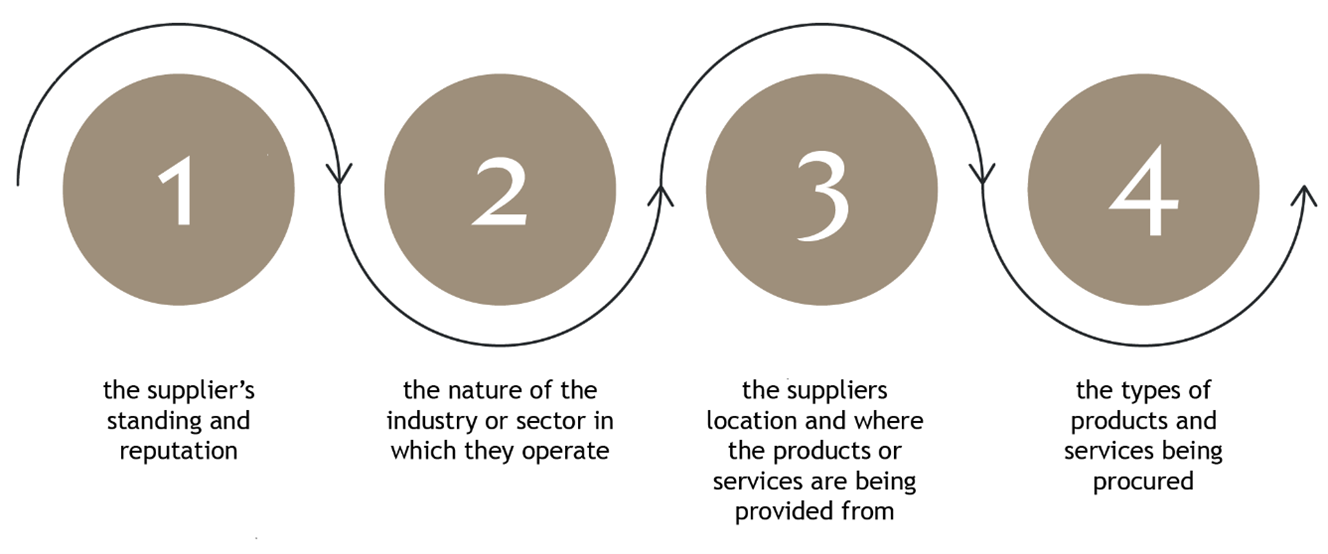Caroline Hayward and Stacy Ford discuss legal considerations when managing supplier relationships. Simon Perry, KWM’s Procurement Manager, also provides his practical insights in relation to managing supplier relationships from the commercial perspective. Read on for the latest in KWM’s inhouse-centred series: From our inhouse to yours.
‘Everyone is a customer for somebody, or a supplier to somebody’ – W. Edwards Deming
Suppliers play a vital role in providing the products and services that support business operations. Managing relationships with suppliers normally falls to the business unit engaging the supplier or a procurement team. However, in-house legal teams also have a position of influence in relation to these relationships. Often that is through setting the tone of the relationship during negotiations, forming responsibilities through contract, triaging the relationship issues, or simply being there for the breakup.
Navigating the legal aspects of these relationships can sometimes feel daunting for the stakeholders involved, particularly where a supplier is not living up to expectations. In this article, we will explore legal considerations when navigating these relationships. We will also hear from KWM’s Procurement Manager, Simon Perry, who will provide his own insights on how to effectively manage supplier relationships from the commercial perspective.
Supplier selection and onboarding
It’s always advisable to find out about who you are getting into a relationship with, and that is the same for supplier relationships. This involves getting close to your supplier, getting to know their offerings, how they operate, and importantly (if not a little selfishly), how they are going to meet your requirements. This is the stage where the business decides to move forward with the supplier relationship or to place them in the friendzone.
Supplier due diligence
Suppliers should undergo a supplier due diligence regime before onboarding. The extent of this regime will depend on the level of risk associated with the supplier and the products or services being procured. Consideration should be given to:

Supplier due diligence is normally conducted by a procurement team. We asked Simon what he looks for when carrying out DD on suppliers. He said that depending on the risk and spend involved, you should consider a credit/financial stability check, reviewing their modern slavery policy, considering their data protection and retention policies, and considering other ESG considerations, such as diversity data and any available carbon reports. Simon advised that as part of his supplier DD regime, he can assess suppliers across thirty different reporting areas.
Supplier Code of Conduct
In a previous article (Floating In a Sea of Ethics: The Supplier Code of Conduct (And Why You Need It), we advised of the importance of having a Supplier Code of Conduct in place with your suppliers. A Supplier Code of Conduct sets out an organisation’s requirements and expectations of its suppliers in relation to their conduct. It covers areas that may give rise to compliance and ethical risks, as well as setting requirements in relation to ESG and sustainability.
It is during the selection and onboarding phase of the relationship that you should provide your Supplier Code of Conduct to the supplier. This will clearly set out your expectations on conduct at the outset of the relationship. The code may be accepted by the supplier as a standalone document, or you may embed it in your supplier agreement. In any event, it is important to have your expectations and requirements set down in writing so that you can easily refer back to it if something goes awry.
Confidentiality and protection of intellectual property (IP)
As part of commercial discussions, there is often a need to share sensitive or proprietary information so that the supplier can understand your intentions and you can understand whether they can meet your requirements. Before sharing any information, you should consider putting a confidentiality agreement in place with the supplier to ensure that your information is protected from the outset.
A well drafted confidentiality agreement should also protect your organisation’s intellectual property. Your IP includes your patents, trademarks/logos, copyrights and trade secrets. When collaborating with suppliers on new products or innovations, you should address ownership and licensing of IP rights in relation to those new products and innovations. The arrangement should be captured in the supplier agreement and should consider not only the treatment of new IP, but also how your existing IP is treated.
Forming the legal relationship
Most in-house lawyers will see their raison d’être in the supplier lifecycle as working on the supplier agreement. Legal counsel should take the lead on drafting, reviewing and negotiating amendments to the supplier agreement, and advise the business on the contractual obligations.
Commercial discussions and negotiations
Somewhere, someone once said that relationships are a negotiation (as restated by Dr Phil). In-house lawyers have a role to play in guiding the business through supplier negotiations, particularly where there are contractual or other legal issues being discussed, or where the supplier has invited their legal counsel along to the conversation.
We asked Simon about the things that he wants to know from suppliers during these discussions. He said that a lot of the commercial discussion centres on pricing, particularly in relation to the validity of pricing, breakdown of pricing, and pricing on renewals.
Simon says that when entering into commercial discussions it is important to remember the basics – that it is the job of the supplier to make money from the sale of their products or services, and it is the job of the customer to get the best value for their money. He warned that the supplier will have a walkaway position if pushed too far, and that it is equally important for you to consider your walkaway position before going into commercial negotiations.
The Supplier Agreement
The Supplier Agreement is the centrepiece of the supplier relationship. It codifies all of the obligations and requirements agreed between the parties during commercial discussion. It makes the relationship legally binding. When there is a misunderstanding or a break down in the relationship, both parties will turn to the agreement to see what it says about the issue. So, it is very important to get the supplier agreement right.
You should ensure that the terms are clear and comprehensive. They should specify the scope of work, key milestones, payment terms, warranties, and service levels. You should be drawn to other important terms, such as limitation of liability, indemnification, data protection, confidentiality and intellectual property rights. If you want some tips on what to look out for when reviewing (or drafting) a supplier agreement, see our article: Master the service agreement: Practical tips to unravel Master Service Agreements.
Do not get rushed into last minute reviews! As in-house counsel, you have a regulatory responsibility to act in the best interests of your client (your organisation). This may mean slowing down the pace so that you have the opportunity to properly consider the terms in order to provide well thought out and impartial legal advice.
In-house counsel should also arrange execution of the supplier agreement to ensure that the agreement is signed by an authorised signatory and that signing formalities have been correctly adhered to. A record of the agreement should also be kept by both the in-house legal team (in a register or as part of your matter file) and the relevant business unit.
Maintaining the relationship
After the dust has settled on the honeymoon period, the reality of maintaining the relationship sets in, and maintaining the relationship comes down to good communication. It is necessary to reflect back on what has been agreed and to keep track of the services being provided.
Open communication
When we asked Simon about what he considered to be the most important thing in maintaining a supplier relationship, he enthusiastically responded, ‘COMMUNICATION, COMMUNICATION, COMMUNICATION!’. He says that open communication is essential for the parties to understand one another’s requirements and to be clear on KPIs. Regular catchups are necessary to talk about how the supplier is performing, to raise issues, and to resolve those issues as early as possible.
Simon says to be open and honest about what you want, how much you want to pay for it, and what you expect from the supplier in return. It is important to be clear from the start and to work towards a collaborative and transparent relationship.
Keeping track of obligations and requirements
Supplier obligations and requirements should be captured in the supplier agreement. It is necessary for the contract owner to know what the obligations and requirements are and to keep track of them. The contract owner should be across deliverables, key milestones, payment schedules and renewals.
Keeping track of renewals or when the contract comes to an end is particularly important. Most in-house lawyers have experienced a contract owner sheepishly putting forward a renewal agreement whilst mumbling something about the contract expiring two months ago – surprise! The work doesn’t end with contract execution and in-house lawyers should remind contract owners that there are obligations and requirements that they need to keep track off during the lifecycle of the supplier relationship.
Performance monitoring and audits
Performance monitoring and providing feedback is an important step in managing the supplier relationship. It keeps your supplier honest and avoids complacency. You should put in place a performance monitoring program with your suppliers, where you regularly assess your suppliers’ performance to ensure that they are meeting their agreed deliverables, timeframes and quality standards. The method of performance monitoring can be outlined in a service level annexure or agreement.
Another mechanism that can be included in the supplier agreement, is an audit provision. This provision allows you to inspect and audit the supplier’s operations to assess performance, compliance, and quality control. An audit provision can also be included under the Supplier Code of Conduct, enabling you to audit the supplier with regard to their conduct and ethical commitments.
Concluding the relationship
Like your best friend, in-house legal teams are often involved (or have something to say) about the breakup of the relationship, whether the breakup is amicable or not. It is therefore important for in-house lawyers to be across the termination provision in the supplier agreement and to also look through the agreement for any obligations that continue post termination.
Breaking up
In-house lawyers are brought into conversations with the contract owner on how to end the relationship. Of course, the first thing to find out is what is driving the breakup – it may just be that the term has come to an end and there is no need to renew, or it may be that there have been consecutive breaches of service levels and it’s time to part ways.
Once you know the reason for the breakup, then you need to look at the termination provision under the supplier agreement to determine the course of action. Even where the contract is being terminated by mutual agreement, or where it will simply just come to an end, you still need to review the agreement to make sure that correct process is being followed.
Where the breakup is not so straightforward and there are grievances with the supplier, you will also need to look at the dispute resolution provision. It may be a requirement for the parties to attempt to resolve disputes through alternative dispute resolution methods (mediation, arbitration, conciliation etc). It is normally a precondition to attempt ADR prior to commencing proceedings against a supplier (except where you are seeking injunctive relief).
Strings still attached?
Finally, it is important for legal counsel to review the supplier agreement to see what strings are still attached following termination. Continuing obligations may relate to the liability of the parties for actions during the relationship, maintaining confidentiality, or arrangements in relation to intellectual property. Data destruction and retention obligations should also be considered. This may include requiring the supplier to provide you with a data destruction certificate after termination, or agreeing a process to have data returned to you.
Navigating the legal landscape
In-house legal teams play an important role in supporting the business with managing supplier relationships. Involving legal expertise from the outset, particularly with the supplier agreement, will enable businesses to confidently navigate the legal landscape and ensure successful supplier relationships.
Further information
If you need further guidance on managing supplier relationships or putting in place supplier agreements, please reach out to your KWM contact or Kirsten Bowe.
Check out other insights from the Office of General Counsel team here and subscribe to KWM Pulse using the button below to stay across upcoming articles in areas of interest.









